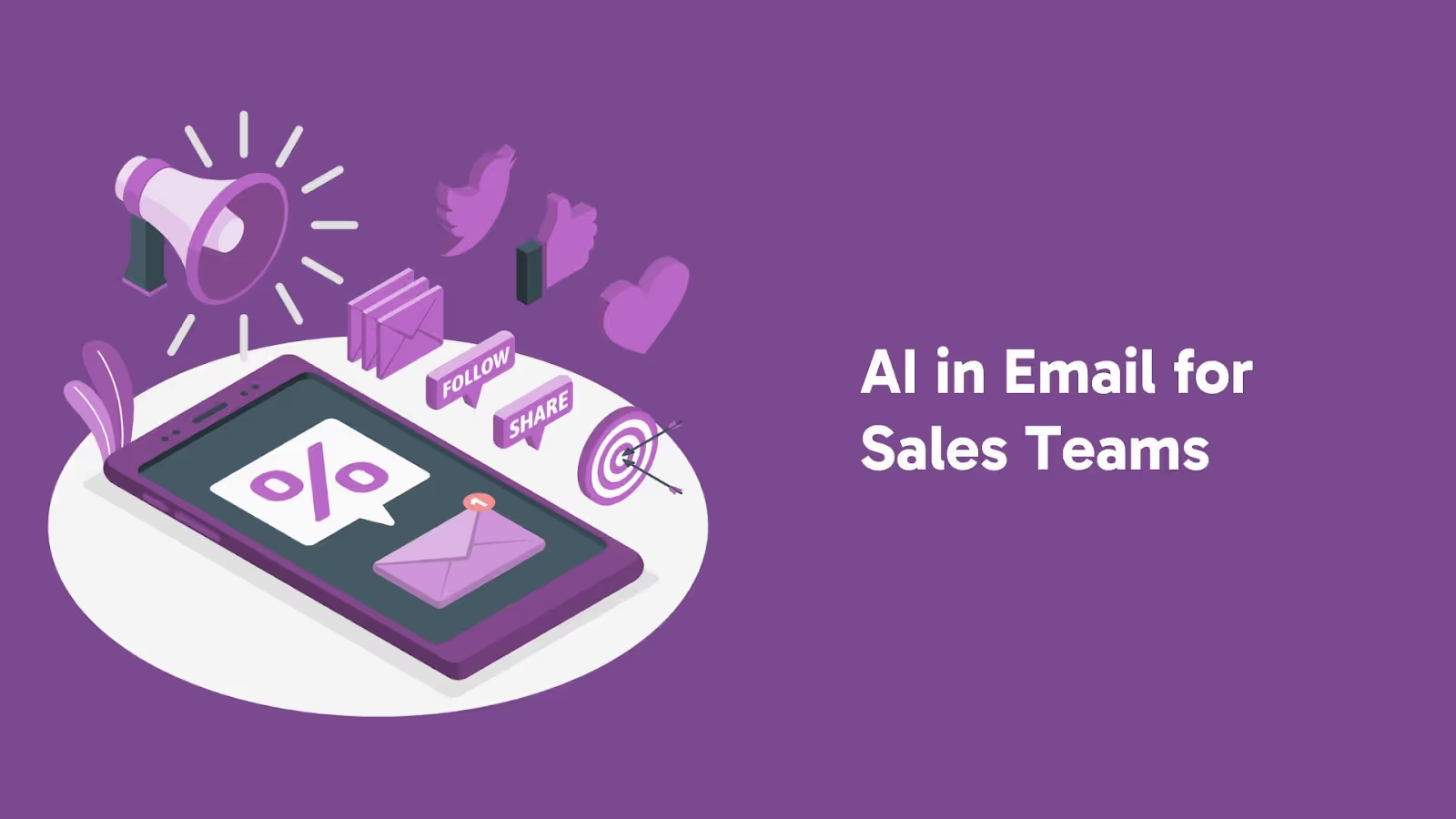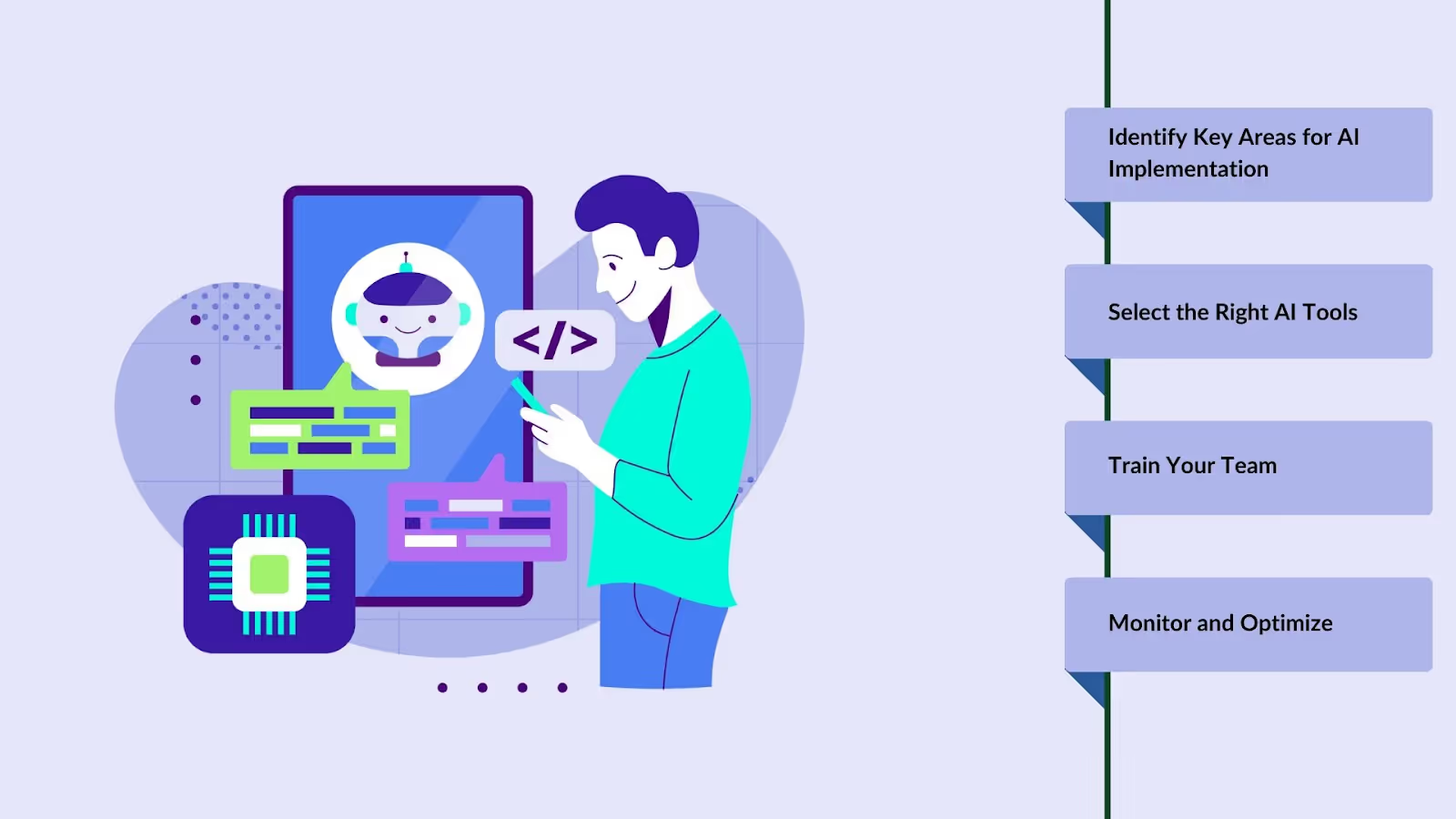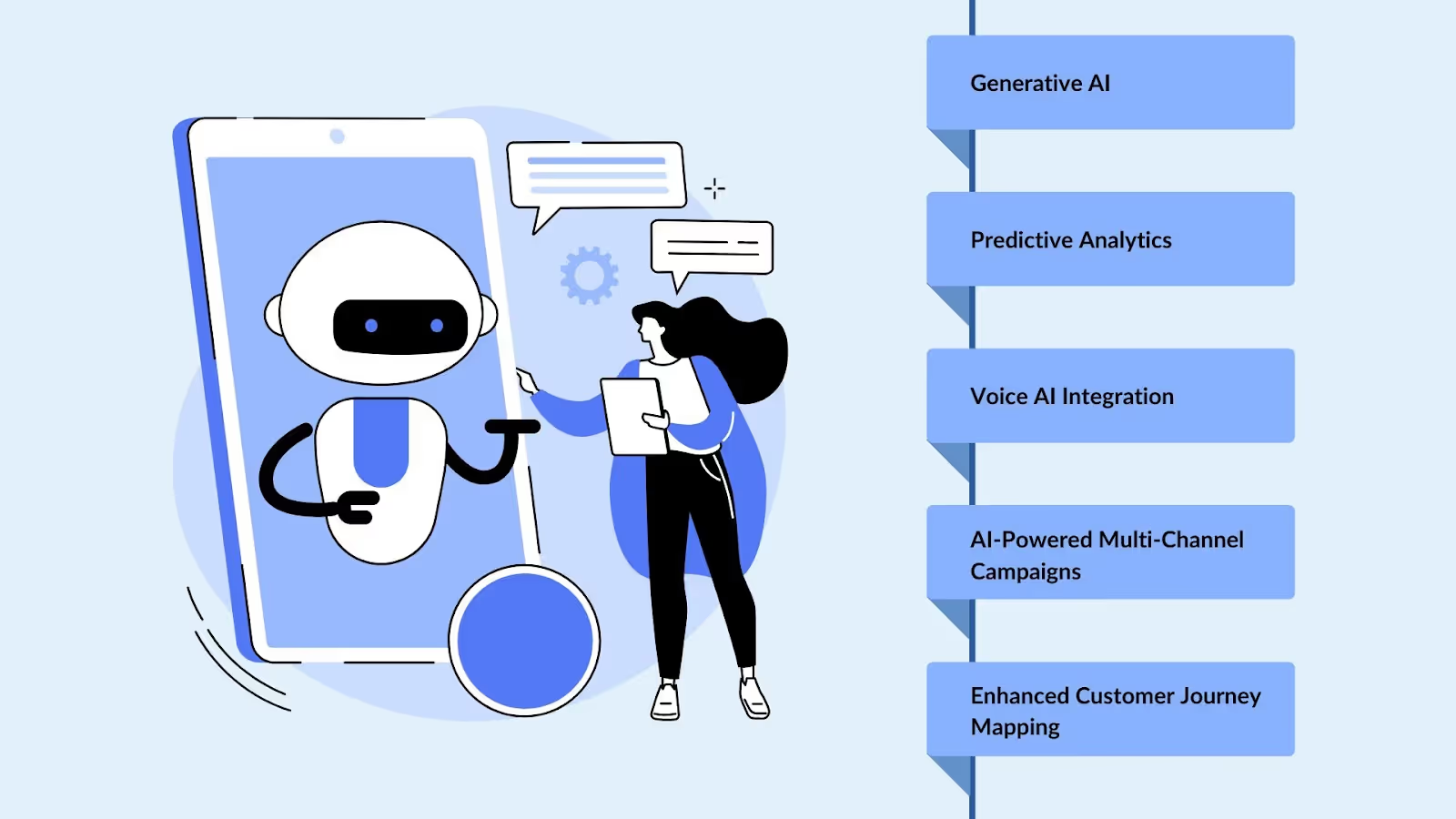Boosting Sales Efficiency with AI Email for Sales Teams


Don’t miss what’s next in AI.
Subscribe for product updates, experiments, & success stories from the Nurix team.
Boosting Sales Efficiency with AI Email for Sales Teams
Sales teams constantly face the challenge of maximizing efficiency while maintaining a personal touch with clients. With the increasing pressure to achieve more in less time, AI in email for sales teams has emerged as a game-changer. This technology not only automates repetitive tasks but also enhances the personalization of communication, allowing sales teams to focus on what truly matters ‘closing deals’.
What Does AI Email for Sales Teams Mean?
AI Email for Sales Teams refers to the integration of artificial intelligence (AI) technologies into the email communication strategies used by sales teams. This involves leveraging AI to automate, personalize, and optimize email interactions with prospects and customers, making the sales process more efficient and effective.
Key Benefits of AI in Sales Emails
In this section, we’re going to walk through the key benefits that AI brings to the table, like boosting efficiency, personalizing content, and driving better engagement with your audience. By the end, you’ll see why integrating AI into your email strategy isn’t just a smart move.
- Personalization at Scale: AI in email for sales teams can personalize emails based on customer data so each message is relevant and personal even to thousands of contacts.
- Efficiency Gains: By automating follow-ups and scheduling, AI in email for sales teams frees up time for sales reps to do high-value activities, increasing overall productivity.
- Data-Driven Insights: AI in email for sales teams analyzes previous email campaigns to give you actionable insights to optimize future email strategies.
- Enhanced Targeting: AI can identify the best leads by analyzing huge amounts of data, browsing behavior, past interactions, and demographic information. Sales teams can focus on prospects most likely to convert, making their campaigns more efficient.
- Improved Timing: AI can predict the best time to send emails, so messages are delivered when recipients are most likely to engage. This increases the chances of emails being opened and acted upon, improving overall campaign performance.
- Reduction of Human Error: AI reduces the chance of human error by automating routine tasks like data entry and follow-up scheduling. Emails are sent accurately and consistently, which means more reliable and professional communications.
- Scalability: AI allows your email strategies to scale quickly as your business grows. AI tools can handle the increasing volume of email communications without sacrificing personalization or engagement, making it easier to maintain high customer satisfaction.
- Behavioral Insights: AI can analyze customer behavior over time so sales teams can adjust their strategy based on how customers interact with emails. This can include changing the content, timing, or frequency of emails to better meet customer needs and expectations.
With these benefits in mind, let’s explore the specific AI tools for B2B sales that are revolutionizing AI in email for sales teams.
Top AI Tools for Sales Email Optimization
When choosing the right AI tools, it’s essential to consider those that align with your sales goals and integrate seamlessly with your existing systems. Here are some top contenders for AI in email for sales teams:
- Nurix AI: Nurix AI has advanced AI-driven solutions for communication channels, including email. It integrates with existing enterprise systems to provide real-time insights, streamline communication workflows, and ensure emails are timely, relevant, and highly personalized.
- Salesforce Einstein: This tool uses AI to provide predictive lead scoring, email recommendations, and personalized content suggestions, an excellent solution for sales teams looking to use AI in email for sales teams.
- HubSpot’s AI Features: HubSpot offers AI-powered email automation, which includes predictive analytics and personalized email drafting. It is a popular choice for AI in email for sales teams.
- lemlist: Known for hyper-personalizing cold emails and automating follow-ups, lemlist helps sales teams get way more responses, making it a strong contender for AI in email for sales teams.
These sales automation tools are just the tip of the iceberg regarding AI in email for sales teams. Each offers unique features that can significantly enhance your sales email strategy. However, integrating these tools effectively is crucial to realizing their full potential in AI in email for sales teams.
How to Integrate AI into Your Sales Email Strategy

Adding AI to your sales email isn’t just about buying a tool – it’s about integrating it into your existing workflow. Here’s a step-by-step guide to get you started:
- Identify Key Areas for AI Implementation: Determine where in your email strategy AI can make the most impact on your sales team—lead scoring, content creation, or follow-up automation.
- Select the Right AI Tools: Pick tools that align with your sales goals and integrate with your existing CRM or email platform. These tools should support AI for sales teams.
- Train Your Team: Make sure your sales team knows how to use these tools. This might involve training sessions or workshops to show them how the tools work and the benefits of AI for sales teams.
- Monitor and Optimize: Review AI email performance regularly. Use the data from these tools to continuously refine your AI strategy for sales teams.
By choosing and integrating the right tools, sales teams can get a lot more out of AI. We know the benefits of AI in email, but we also need to be aware of the challenges and how to overcome them.
AI Email for Sales Teams: Challenges and Considerations
Despite the benefits, there are challenges to implementing AI in email for sales teams. These include data privacy, over-reliance on automation, and continuous oversight to ensure AI-generated content matches your brand voice in AI in email for sales teams.
- Data Privacy: With AI tools analyzing customer data, compliance with data protection regulations is key in AI in email for sales teams. Sales teams must handle data with care to avoid breaches and maintain customer trust.
- Human Oversight: While AI can send emails, human oversight is needed to keep it authentic, is emotionally intelligent, and prevents miscommunication in AI in email for sales teams. Ensuring AI outputs match your brand voice is critical.
- Balancing Automation with Personal Touch: While AI can personalize emails, don’t lose the human touch that makes communication real in AI-enabled emails for sales teams. Finding the right balance between automation and personal interaction is key.
- Potential Over-Reliance on AI: Relying too much on AI could reduce creative problem-solving and human intuition within the sales team. Use AI as a tool to enhance human capabilities, not replace them.
- Integration Challenges: Implementing AI tools into existing systems can be complex and time-consuming. Integration issues can disrupt workflow and hinder AI if not appropriately managed.
- Cost Implications: AI tools can be expensive to implement and maintain, especially for smaller sales teams or businesses with limited budgets. The costs of AI include software subscriptions, data storage, and ongoing training.
Mitigation Strategy: Set clear guidelines for AI use around customer data. Audit AI-generated content regularly to ensure quality. By addressing these challenges now, you can get the most out of AI while keeping control of your sales comms in AI in email for sales teams.
Looking ahead, the role of AI in email for sales teams is set to grow even more prominent.
Real-Life Examples of Sales Efficiency with AI Email for Sales Teams
As AI continues to revolutionize sales strategies, real-world examples highlight its impact on boosting efficiency and driving sales growth. Below are notable cases where companies have successfully integrated AI into their email strategies, resulting in significant improvements in engagement, conversions, and revenue.
1. Netflix: Personalized Content Recommendations
Netflix leverages AI to personalize email content based on users’ viewing histories and preferences. By analyzing user data, Netflix sends highly relevant content recommendations through email, which has significantly enhanced user engagement and retention. This tailored approach ensures that emails resonate with the audience, driving higher open rates and increased viewership.
2. The Washington Post: Tailored Newsletters
The Washington Post utilizes an AI-driven tool called Heliograf to customize email newsletters based on individual reader preferences. This tool helps create personalized news updates, leading to a 20% increase in open rates and a 17% rise in subscriber engagement. By delivering content that readers are more likely to find interesting, the publication has successfully increased reader loyalty.
3. Sephora: AI-Enhanced Product Recommendations
Sephora employs AI in its email campaigns to analyze customer data and recommend personalized beauty products. By leveraging AI, Sephora has experienced a 70% increase in email-driven revenue, showcasing how tailored email marketing can lead to substantial financial returns.
4. Grammarly: Optimizing Engagement
Grammarly uses AI to personalize and optimize its email campaigns, focusing on users’ writing habits to deliver relevant content. This targeted approach has resulted in a 25% increase in engagement rates, highlighting AI's effectiveness in enhancing email marketing efforts.
These real-life examples underscore the power of AI in transforming email strategies for sales teams. By leveraging AI to personalize content, optimize engagement, and deliver targeted recommendations, companies can achieve substantial improvements in customer interaction and sales performance.
Future Trends in AI Email for Sales

The future of AI in email for sales teams is bright and getting brighter. Emerging tech, like generative AI and machine learning, will take sales teams to the next level. Here’s what’s next:
- Generative AI: Tools like GPT-4 are being developed to create highly personalized email content that can adapt to recipient behavior in real-time, a significant leap for AI in email for sales teams.
- Predictive Analytics: Future AI tools will offer more accurate predictions of customer responses, allowing sales teams to fine-tune their strategies even further in AI in email for sales teams.
- Voice AI Integration: The integration of AI with voice assistants could lead to more dynamic and responsive email communication. Sales reps could send personalized emails via voice commands, enhancing AI in email for sales teams.
- AI-Powered Multi-Channel Campaigns: AI will increasingly enable sales teams to orchestrate multi-channel campaigns that seamlessly integrate emails with other touchpoints like SMS, social media, and direct mail. This approach ensures consistent and personalized messaging across all platforms, leading to higher engagement and conversion rates.
- Enhanced Customer Journey Mapping: Future AI tools will offer more sophisticated customer journey mapping, allowing sales teams to understand and predict each customer's journey with even greater precision. This capability will enable more effective targeting and personalization, leading to improved customer experiences and better sales outcomes.
The future of AI in email for sales teams is not just about automation; it’s about creating more profound, more meaningful connections with customers through enhanced personalization and insights in AI in email for sales teams.
Measuring the Impact of AI on Sales Emails
As more and more sales teams use AI in their emails, it’s essential to know how well these tools work. To measure the success of AI-driven email campaigns, sales teams need to focus on specific metrics that show performance and customer engagement.
Key Metrics to Monitor:
- Open Rates: This measures the percentage of people who open your emails. A high open rate means your subject lines and send times are optimized, possibly because of AI’s predictive powers.
- Click-Through Rates (CTR): The percentage of people clicking links in your emails. CTR shows how relevant and appealing your email content is, which AI can enhance with personalized messaging.
- Response Rates measure how many people respond to your emails, whether through replies or actions. AI can help improve response rates by addressing specific customer needs.
- Conversion Rates: The most critical metric, conversion rates, measure the percentage of people who take the desired action, whether buying or signing up. AI can supercharge conversions by personalizing content and timing.
By tracking these metrics, sales teams can tune their email and get the most out of AI in email for sales teams. AI can analyze the data and see customer behavior patterns so you can adjust them in real time and ensure your email campaigns are always in sync with customers and the market.
Conclusion
AI in email for sales teams is no longer a futuristic concept, it’s a reality transforming how sales teams operate. By automating repetitive tasks, providing data-driven insights, and enhancing personalization, AI in email for sales teams empowers sales teams to work smarter, not harder. However, it’s crucial to integrate these tools thoughtfully and balance automation and the personal touch that defines successful sales communication.
Ready to supercharge your sales emails with AI? Nurix AI offers advanced, AI-driven solutions that seamlessly integrate into your sales processes, delivering personalized and timely communications that convert. Don’t just follow the trend, lead the way. Get in touch with us!

Don’t miss what’s next in AI.
Subscribe for product updates, experiments, & success stories from the Nurix team.









